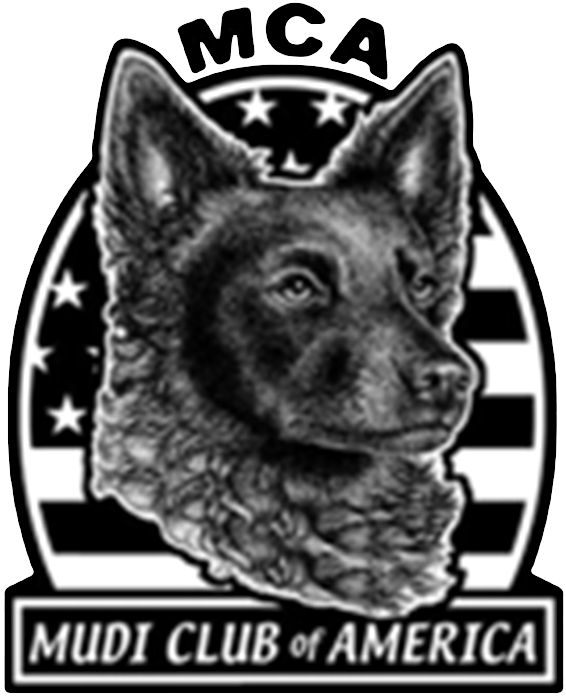
Frequently Asked Questions
-
The Mudi, pronounced "moodie", is a medium sized herding dog from Hungary which has been in existence since the nineteenth century. It is said the Mudi evolved naturally from crosses of the Puli, Pumi & German Spitz type breeds. The distinguishing characteristic of prick ears led experts to classify this type by naming & registering the breed in 1936. Today the Mudi is seen as an active, intelligent, biddable working breed. The Mudi is a rare breed. It is estimated there are no more than a few thousand Mudis worldwide, with the greatest numbers being in Hungary, followed by Finland, and scarcer throughout Europe, the U.S., and Canada. The Mudi excels at agility, obedience, and flyball, as well as other dog sports. He is a true working breed and shines when herding both cattle and sheep, and has found fame as a Search and Rescue dog in both Finland and the U.S.
-
All dogs are individuals and their temperaments vary widely, but, generally,around people he knows, the Mudi is a friendly and playful dog (one fancieronce compared them to a cross between a Miniature Poodle and a GermanShepherd Dog, both in look and temperament).
The average Mudi is neither shy and fearful nor exuberant and overjoyed when meeting new people. That’s not to say you can’t find individuals of either inclination. In fact, it is not unheard of for some young Mudi to exhibit a lack of self-confidence that may manifest in shyness, or, conversely, aggression (putting on a gruff face to mask his insecurity). Still, he is first and foremost a herding dog, and as with most herding breeds he can display a certain aloofness during initial meetings. Once he knows and trusts a person, however, he is generally easy-going, playful, and affectionate. The Mudi does well with children and other animals when exposed to them from puppyhood.
Many Mudi are quite vigorous in that they approach just about everything head on and with great (almost terrier-like) enthusiasm. They perform with great intensity in whatever they pursue. Mudis sometimes exhibit an almost feral awareness of the environment; although initially quite cautious in some new situations, most recover quickly and proceed fearlessly. Make no bones about it: these are tough little dogs. One word that sums up this breed is "scrappy". They have been bred to herd sheep and sometimes cattle. They’ve been used to help hunt wild boar. They even lend a paw when there’s ratting to be done. Anyone considering a Mudi should be well aware that this fearless attitude can exhibit itself in some not-so-welcome behaviors, such as dog-against-dog aggression, as well as obstinacy, and just plain pushiness. These are rare and mostly self-limiting adolescent male behaviors, but one should be prepared nonetheless. Shyness has also been noted, particularly in certain lines. Socialization, early and often, is key in exposing pups to new situations and preventing any future problems with shyness or fearfulness (remember, anything a Mudi does is usually quite dynamic-including exhibit behavior problems; the Mudi work ethic is such that if something is to be done, it should be done BIG, and that applies across the board).
-
Mudi are very easy to train, however, it is best to use positive reinforcement methods rather than heavy-handed dominance-based methods. As with all herding breeds, the Mudi is sensitive to strong-arm correction sand will learn far more quickly if he is trusting of his trainer and they work together as a team.
-
Mudi are well suited to the house and it’s advised that the Mudi be treated as a member of the family and notbe relegated to living in the backyard. He likes to be close to his people and is generally quiet and low-energyin the house. The Mudi does not fare as well in apartments or community housing situations only due to histendency to bark. However, a Mudi taught to “quiet” on command should have no problems adapting toapartment living. Note, some animals can be difficult to housebreak and this should be taken intoconsideration when bringing a Mudi into the home. However statistics prove housebreaking is not a problem inmost cases.
-
Mudi are generally good with children and other animals, and exceptionally so if raised with them.
-
As mentioned above, perhaps one of the only drawbacks to living with a Mudi is his propensity to bark-at just about everything. One must remember that one of the Mudi’s jobs in his homeland is to alert the bigger flock guardians (Kuvasz, Komondor) when he senses trouble. This has, not surprisingly, spilled over to the domestic Mudi as well. Some lines are barkier than others, but in general, the Mudi does like to bark. Some folks have found success in controlling barking by teaching it, and the associated quieting, as commands.
-
The Mudi has an easy-to-care for, wash-and-wear coat. With short hair on the head and front of the legs, and wavy-to-curly hair over the rest of the body, a good (and quick) brushing about once a week or so is all this dog needs for grooming. The Mudi is a light-to-average shedder.
-
Black is, by far, the predominant color in this breed, however, there are several other colors appearing such as white, brown, gray (commonly called ash, or hamvas), yellow (also called fako), and the merle pattern(also called cifra)in conjunction with any of the allowable colors. Colors that also appear, but are not accepted as part of the current FCI breed standard, are a the brindle pattern, wolf color, black & tan, yellow with a black mask (also called masked fako) and albinism. Check out our pages explaining all the Mudi colors!
-
According to the FCI standard, the male Mudi should be between 16”-18.5”, with a weight of 24-1/4 to 28-3/4 pounds”; females 15”-17.5”, 17-3/4 to 24-1/4 pounds. However, Mudi size varies greatly in their homeland where dogs are often bred with more attention on their ability to work on the farm than adherence to the dictated standard.
-
The average Mudi should live to be 12-to-14 years old. The breed is relatively healthy however there are reports of dogs with epilepsy, hip dysplasia, congenital cataracts, color dilution alopecia (“blue dog syndrome”), and other inherited health issues. For more information, please visit this links concerning Mudi health issues: http://www.caninehealthinfo.org/brdreqs.html?breed=MDI. Great care and research should the be done before purchasing a Mudi puppy and also when breeding Mudi to avoid using dogs that may contribute to these health issues.
-
Mudi are very energetic dogs. Though they are calm and relaxed in the house, once outside they appreciate agood run. Not surprisingly, Mudi excel at flyball, obedience, herding, and frisbee.
Mudi are quite playful and can be mischievous, particularly when it comes to digging-they are quite the little engineers. They also are noted for their extraordinary jumping ability. A well-exercised Mudi is a Mudi who tends not to find trouble elsewhere either by jumping over, or digging under, any fences keeping him from the greener other side.
-
The AKC fully recognized the Mudi on December 29, 2021 and is in the Herding Group. Mudis will be able to earn Championships along with every other AKC recognized breed. You are also eligible to show in performance and other events offered by AKC and organizations that the AKC recognizes for titling purposes such as NADD and Barn Hunt.
Other venues available to show your Mudi are the United Kennel Club, the American Rare Breed Association, the International All Breed Canine Association of America, ICKC-International Canine Kennel Club, ICE-International Canine Events the Continental Kennel Club, the National Kennel Club, the World Kennel Club, and the Canadian Kennel Club (dogs with foreign registration only-UKC, ARBA, or otherwise-registered dogs are ineligible to compete; contact the CKC for acceptable registries).
Other than conformation the Mudi excels at agility, flyball, frisbee, herding, tracking, and obedience. There are few things a Mudi can’t or won’t do. The opportunities for exhibiting and competing with your Mudi are just about endless!
-
So far, the Mudi sounds perfect. But is he right for you? On the positive side, he is a very versatile, small-to-medium-sized dog; a good companion and worker. He is smart, healthy, fun, and needs little grooming. He is perfect for just about any dog sport you can think of. On the down side, he can be rather barky, and some Mudi are prone to dig. Some individuals (particularly young males) can be independent, stubborn, and ‘opinionated.’ Some can be shy or aggressive towards other dogs. Puppy terror tantrums are not unheard of; new owners can expect to miss a few nights of sleep during the new puppy’s vocalizing his opinion about acclimating to his new home. If none of this dissuades you and you can provide firm, fair, positive leadership, then the Mudi just might be for you. However, as with any dog, one must be prepared to take on the responsibility of caring for this new life for 12 years or more. Quality food, veterinary care, and exercise area must, as is a quality puppy class, adult training, and ongoing socialization. Do you plan on competing in any dog sports? Do you plan to show your Mudi or are you just looking for a companion? The Mudi will do well in all of these capacities, provided you minister firm yet kind and respectful handling of your new charge. If this be the case, this wonderful and charming dog may just be for you.



